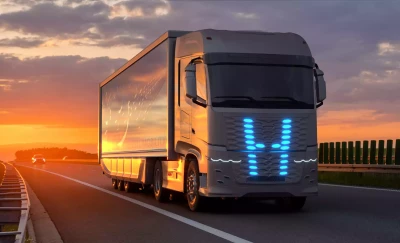5 Emerging Trends in Transport Technology
April 14, 2025
 The transportation industry is undergoing rapid transformation driven by a wave of new technologies that promise to reshape how freight is moved, monitored, and managed. From AI-powered automation and real-time cold chain tracking to the rise of alternative fuels, these innovations are helping logistics professionals respond to evolving market demands with greater speed, efficiency, and precision. As infrastructure catches up and adoption widens, staying ahead of these five key trends will be essential for anyone looking to stay competitive in the modern freight landscape.
The transportation industry is undergoing rapid transformation driven by a wave of new technologies that promise to reshape how freight is moved, monitored, and managed. From AI-powered automation and real-time cold chain tracking to the rise of alternative fuels, these innovations are helping logistics professionals respond to evolving market demands with greater speed, efficiency, and precision. As infrastructure catches up and adoption widens, staying ahead of these five key trends will be essential for anyone looking to stay competitive in the modern freight landscape.
Alternative Fuels
Alternative fuels are driving innovation in the transportation industry, but progress depends on more than just technology. While renewable diesel, compressed natural gas (CNG), and electric vehicles promise reduced emissions and long-term cost savings, their success hinges on the availability of supporting infrastructure. Fleets considering a transition to alternative fuels must weigh environmental benefits against the logistical realities of fuel accessibility, maintenance requirements, and upfront investment. As infrastructure evolves, these solutions will play a critical role in shaping the future of sustainable freight transport.
Will alternative fuels find a place in the rapidly expanding global supply chain? See what our experts have to say in this recent episode of the Stay In Your Lane Podcast.
Automation
Automation is reshaping the transportation industry, but its true value lies in augmenting human capabilities rather than replacing them. At its best, automation is leveraged to handle repetitive tasks—such as data entry and load assignments—allowing professionals to focus on strategic decision-making and complex problem-solving. The integration of technologies like APIs enhances communication between shippers, carriers, and brokers, especially in dynamic, low-volume lanes where traditional methods like EDI fall short. However, successful adoption hinges on building trust in these systems through consistent, positive outcomes. By thoughtfully implementing automation, the freight industry can achieve greater efficiency while maintaining the essential human oversight that ensures adaptability and resilience in an ever-evolving market.
Transportation Manager Michael Potter examines the balance between innovation and the needs of workers in this episode of the podcast.
Closed-Room Rating
Closed-room rating, powered by API integrations, is transforming freight brokerage by enabling faster, more accurate quoting within exclusive, invitation-only marketplaces. Unlike traditional open load boards, these closed environments allow shippers to invite a select group of trusted brokers to bid on specific lanes before the loads are publicly listed. This approach combines the flexibility of spot market pricing with the reliability of established partnerships, offering shippers greater control over their freight operations. By leveraging real-time data and automation, brokers can respond swiftly to market changes, ensuring competitive rates without compromising service quality. As the logistics industry continues to evolve, embracing closed-room rating systems positions both shippers and brokers to navigate market fluctuations more effectively and maintain strong, dependable relationships.
Learn more about the advantages of closed-room systems in our conversation with Thomas Mella, President/Founder of Sightline Freight Partners.
Real-Time Temperature Tracking
Real-time temperature tracking is revolutionizing cold chain logistics, offering immediate visibility into shipment conditions and enabling proactive interventions to maintain product integrity. Despite its benefits, adoption remains limited among some food shippers, a gap that’s increasingly critical as the Food Safety Modernization Act (FSMA) transitions to stricter enforcement in the near future. This shift will mandate comprehensive documentation and tracking for food shipments, making real-time monitoring not just advantageous but essential. Embracing these technologies now positions companies to meet regulatory demands and safeguard against costly product losses.
Get up to speed on real-time tracking before the FSMA enforcement deadline with this episode featuring Tive Director of Sales Rajah Nagarajah.
Artificial Intelligence
Artificial intelligence (AI) is reshaping freight logistics by automating repetitive tasks such as data entry and communication, thereby freeing professionals to focus on strategic decision-making. However, the true potential of AI lies in its ability to augment human capabilities rather than replace them. While AI excels at processing vast amounts of data and optimizing operations like warehouse scheduling, it lacks the nuanced understanding required for relationship-building and complex problem-solving. Integrating AI with human expertise ensures a balanced approach, leveraging technology for efficiency while maintaining the critical human touch that drives adaptability and resilience in the transportation industry.
Learn how to strike the right balance between AI and the human element in our discussion with MIT Researcher Chris Caplice.
As the freight industry continues to evolve, embracing these emerging technologies is more important than ever. At Triple T Transport, we’re committed to helping our partners navigate this shifting landscape with practical, tech-forward 3PL solutions that balance cutting-edge tools with dependable, personalized service. Whether it’s through advanced automation or real-time visibility, Triple T delivers the expertise and support you need to stay ahead of the curve and keep your supply chain moving.














